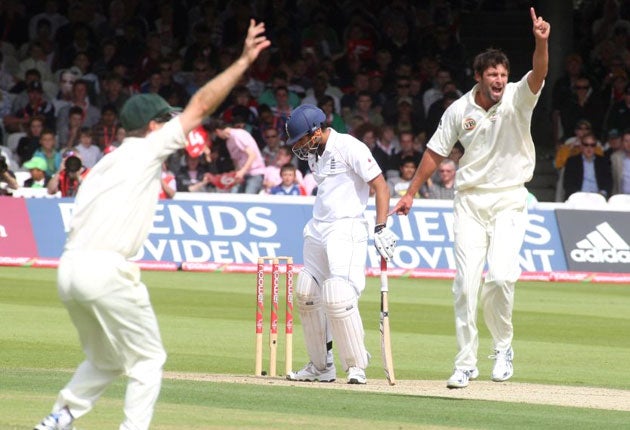Chris McGrath: Captain wins respect after Cardiff feud
Cardiff's rearguard action was inspiration – but familiar troubles will be remembered

It is not just the aching joints and sinews of Andrew Flintoff that measure the difference between Test cricket and the feckless, coppiced versions of the game that will keep him off the streets after this summer. As we saw the last time these sides contested a second Test, at Adelaide in December 2006, even the deepest foundations – and they don't come much deeper than 551 for 6 declared – can soon be betrayed by the blokes on the scaffolding.
But an engrossing day here certainly fortified the sense that you build a position in a Test match, as the house in scripture, upon rock rather than sand. Cricket's defining mystique is the way it harnesses the collective fortunes of your comrades to your private, gladiatorial struggles, as bowler or batsman. And while the first Test in Cardiff showed how that tension may ultimately prove most critical with your last two batsmen at the wicket, as a rule it will be tautest in an opening partnership.
True, in what is widely cherished as the most pregnant atmosphere in Test cricket – the first morning of an Ashes match at Lord's – it might be argued that the electrifying start made by Andrew Strauss and Alastair Cook had its own foundations in the 11 epic overs shared on Sunday evening by James Anderson and Monty Panesar.
Strauss and Cook put on 196, a record opening stand for England when entertaining Australia on these sacred acres. And while they were about it, they seemed to be achieving a fresh interpretation of the ambivalent messages bequeathed by Cardiff. Yes, England had got away with some execrable cricket there. But the bottom line was that Australia could not get the job finished, despite having five frontliners in the hutch by lunchtime on that final day. Glenn McGrath, you may be sure, would not have been long detained by Panesar, and nor would the modern master of the Lord's slope ever have given Strauss and Cook a hundredth of the freedom offered by Mitchell Johnson during his excruciating flirtation with the yips.
Of course, the momentum achieved in this sort of runaway partnership is commensurate with the exorbitant mental pressures embraced by every opening batsman. When fielders watch their strike bowlers being gaily stifled, the psychological effect is very akin to the gradual excoriation of the new ball itself.
For a time it almost seemed possible – almost – to feel pity for the visitors, whose long unbeaten lease on St John's Wood seemed so suddenly to have run its course. The wicket might have been exhumed from Cardiff, but for its more romantic properties. They say that this place will inspire visiting cricketers rather more dependably than those who have played Middlesex here in front of three men and a dog. But familiarity has plainly not bred contempt in Strauss, who set about holding his team together not just as captain, but as the local squire.
It is still relatively early days for Strauss as a leader, but there are those who suspect that the phlegm and stoicism that sustain him as an opener might take on a less flattering complexion – as inertia, perhaps, or lack of enterprise. But his team were shamed by his example here.
Cook could be easily exonerated. Though once again playing across the line, he could hardly have expected to be pinned on the back leg by anything as exotic as a straight ball from Johnson. But the deranged exit strategy devised by the next men represented a ghastly contrast with the granite consolidation achieved by Australia's own batsmen at Cardiff.
Ravi Bopara persuaded himself that the stage had been set for some kind of preening, swashbuckling exhibition. Kevin Pietersen, if anything, seemed still more excit-able. He is making it increasingly difficult to know whether we should laugh or cry. And here was their captain, as the shadows lengthened, back in his element against the second new ball – still picking the right one to hit, still picking the gap, still gnawing at the consciences of those who had failed him up on the balcony.
In the Australians, meanwhile, we had seen how precisely the same assets thought to define an opening batsman must suffuse every deed in a Test match. There were times when they seemed in bewildering disarray, topping up the donations lavished by their bowlers with larky byes and overthrows. But they never lost sight of the fact that the next ball could be the one that changed everything. Nor did Strauss, vigilant to the end, and there was authentic fellowship in the way he was pursued towards the pavilion by various Australians, eager to offer their congratulations.
Too much had been made of a cursory remark by Ricky Ponting, their captain, about England's clumsy time-wasting during Monty's last stand. Here was the true spirit of cricket, no less evident than during their last visit here. By that stage, anyway, Strauss himself might well have borrowed the same words to describe the fortitude of his own middle order. "Pretty ordinary."
Alec's Ashes: Facts from the front line
Harold Larwood, who later emigrated to Australia, did not entirely enjoy his Ashes trip in 1932-33, during which he was relentlessly barracked. "A tour in Australia would be the most delightful period of one's life, if one was deaf," he said.
From Alec Stewart's Cricket Companion (Corinthian, £16.99). To order a copy for £15.29 (inc P&P) visit www.independentbooksdirect.co.uk
Subscribe to Independent Premium to bookmark this article
Want to bookmark your favourite articles and stories to read or reference later? Start your Independent Premium subscription today.

Join our commenting forum
Join thought-provoking conversations, follow other Independent readers and see their replies